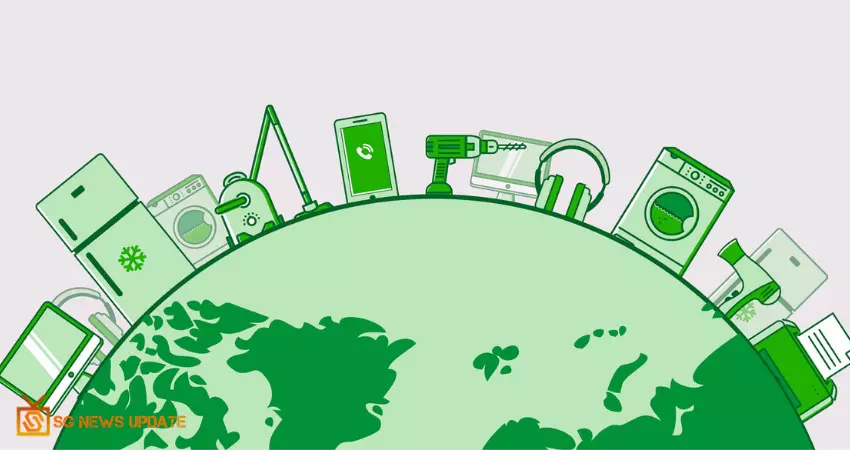
Make it conceivable." That's the interpretation of Karo Sambhav, the Hindi name for a start up that is set for tidy up India's goliath electronic waste mountain. Consistently every year, the nation creates 3.2 million metric huge loads of old cell phones, laptops, screens and more. Quite a bit of it is reused, however with minimal guideline, in regularly grimy and hazardous conditions.
Karo Sambhav needs to bring producers, wholesalers and recyclers together to organize their endeavors to handle e-waste, making a more supportable, circular economy. What's more, Microsoft – which itself intends to produce 'zero waste' by 2030 – is giving the innovation behind it.
The UN has cautioned of an e-waste 'tsunami' except if more is done to handle the world's quickest developing waste stream – one which arrived at 48.5 million tons in 2018. The World Economic Forum's New Circular Vision for Electronics contends that it's the ideal opportunity for a 'worldwide reboot' to speed up the arrangements – and openings – that falsehood covered in this poisonous mountain.
India's e-waste issue is perplexing. The country's thriving, technically knowledgeable economy has made one of the world's greatest hardware markets – along with a lot of utilized and undesirable products. However in a city like New Delhi there is no deficiency of little workshops, reusing everything from cables to motherboards.
The public authority has acted, as well: in 2012 new e-waste the executive rules were presented, convincing electronics organizations to reuse their items. Taken together, these powers ought to be in concordance. However still only 2% of the country's appliances are being reused – and where they are, laborers regularly have little assurance, utilizing acidic showers to remove valuable metals from e-waste.
Something isn't working – and Karo Sambhav originator Pranshu Singhal accepts he has analyzed the issue, and found the fix. "The entire biological system, directly from assortment channels to destroying and reusing organizations to associations that use optional materials for new item creation, needs to work together," he reveals to Microsoft Stories India. "Really at that time would we be able to take care of the issue at scale, since it is preposterous to expect to handle this issue alone."
Singhal understood his group would have to assemble trust with the significant scrap shippers – the 'aggregators' – in urban communities like New Delhi. Karo Sambhav's staff moved into these areas and gradually shaped connections. In any case, they required more than generosity.
The groups started to archive and track aggregators' e-waste shipments' electronically. Colleagues currently transfer photos and different subtleties onto an application – barcoding each thing on the way. The data is then facilitated on Microsoft's Azure cloud platform. Picture acknowledgment, given by Azure Cognitive Services, additionally ensures what's on the bill counts with what's on the truck – at each phase of the exchange.
The outcome has been quick extension for Karo Sambhav – presently working with many organizations, government establishments, 5,000 casual area aggregators and 800 renovation shops. In 2018, it gathered and sent around 12,000 metric huge loads of e-waste for reusing.
Furthermore, for accumulators and recyclers, life has likewise changed. "Business has improved a great deal," aggregator Suhaib Malik tells Microsoft. "We don't need to separate the consoles any longer," he says. "We simply hand them over with no guarantees." Smaller waste pickers are likewise offered help to consent to burden enrollments and keep on top of administrative work – indispensable to Singhal's vision of an improving 'development'.
The arrangements Karo Sambhav is spearheading in India show a portion of the manners in which the world can handle the tremendous e-waste challenge at a worldwide level. Improved item following, also as reclaim plans, could help make a reusing chain that works better – for the planet and for those associated with the interaction.
Innovation could likewise help clear up its own wreck. The Forum and e-waste specialists highlight improvements in the cloud and the internet of things (IoT) that could help "dematerialize" the electronics business. We are conjecture to possess less things in future, and rather to rent innovation as a help – making more noteworthy motivations for producers to repurpose and reuse.
However, as of now, the world is still just preparing around 20% of e-waste fittingly. In the event that the $62.5 billion yearly estimation of e-waste is to be completely used, organizations, recyclers and purchasers need to gain from Karo Sambhav and work together better – and quicker.
Coming Soon...!
Comments (0)